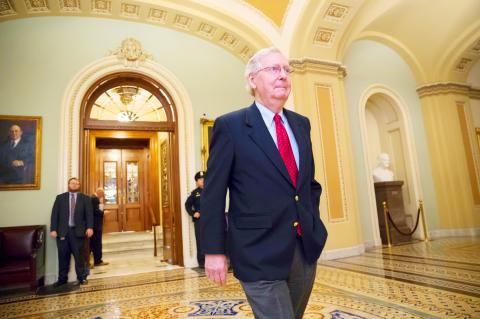US Senate Republicans early yesterday narrowly passed landmark tax reform, a critical step toward delivering a monumental legislative victory for US President Donald Trump in his first year in office.
After a marathon session that stretched overnight, the chamber voted 51 to 49 in favor of the nation’s largest tax overhaul in 31 years, overcoming stubborn internal Republican resistance and dismissing US Democrats angry over last-minute revisions to the bill.
The Senate version and the one passed recently by the US House of Representatives must now be reconciled into a single bill, and approved again by both chambers, before Trump can sign it into law.

Photo: AP
Both versions dramatically lower the corporate tax rate from 35 percent to 20 percent and include more modest tax cuts aimed at individuals across all income levels.
The Senate vote amounted to a reversal of fortune for Trump and Republican leaders, whose bill just 24 hours earlier was on the brink of collapse when a handful of Republican deficit hawks balked at the controversial plan’s US$1.5 trillion price tag for 10 years.
After extensive negotiations, the bill was salvaged. Tax writers tweaked the 479-page measure deep into the night, leaving Democrats furious over the last-minute, handwritten changes to the legislation.
Democrats fumed that they received the text — peppered with extensive handwritten modifications that earned scorn from opposition lawmakers — only a few hours before the vote.
“We understand they have the votes to pass their bill despite a process — and a product — that no one can be proud of and everyone should be ashamed of,” Democratic US Senator Chuck Schumer told colleagues.
Haste and the darkness of night were Trump’s allies in the process, he added.
As the final vote was tallied, grinning Republicans congratulated one another with handshakes, backslaps and hugs.
A trio of Democrats, including Senator Ron Wyden, a ferocious opponent of the bill, stood motionless in the back of the chamber.
Mindful of the historic nature of the vote, US Vice President Mike Pence presided over the chamber during final passage.
A nonpartisan congressional tax scorekeeper had projected the tax overhaul would add US$1 trillion to the deficit, even after accounting for expected economic growth from the plan.
The analysis complicated Trump’s argument that the tax cuts would pay for themselves through additional economic growth.
The Senate and the House must negotiate a compromise bill, and contentious votes are likely in the weeks ahead.
“Now, we will move quickly to a conference committee so we can get a final bill to President Trump’s desk,” House Speaker Paul Ryan said in a statement.
Democrats have argued that the plan is too expensive and would accommodate only the rich, and that it could ultimately impact cherished US entitlement programs such as Medicare.
“The federal treasury is being looted tonight,” Senator Bernie Sanders roared in the chamber.

The CIA has a message for Chinese government officials worried about their place in Chinese President Xi Jinping’s (習近平) government: Come work with us. The agency released two Mandarin-language videos on social media on Thursday inviting disgruntled officials to contact the CIA. The recruitment videos posted on YouTube and X racked up more than 5 million views combined in their first day. The outreach comes as CIA Director John Ratcliffe has vowed to boost the agency’s use of intelligence from human sources and its focus on China, which has recently targeted US officials with its own espionage operations. The videos are “aimed at

STEADFAST FRIEND: The bills encourage increased Taiwan-US engagement and address China’s distortion of UN Resolution 2758 to isolate Taiwan internationally The Presidential Office yesterday thanked the US House of Representatives for unanimously passing two Taiwan-related bills highlighting its solid support for Taiwan’s democracy and global participation, and for deepening bilateral relations. One of the bills, the Taiwan Assurance Implementation Act, requires the US Department of State to periodically review its guidelines for engagement with Taiwan, and report to the US Congress on the guidelines and plans to lift self-imposed limitations on US-Taiwan engagement. The other bill is the Taiwan International Solidarity Act, which clarifies that UN Resolution 2758 does not address the issue of the representation of Taiwan or its people in

US Indo-Pacific Commander Admiral Samuel Paparo on Friday expressed concern over the rate at which China is diversifying its military exercises, the Financial Times (FT) reported on Saturday. “The rates of change on the depth and breadth of their exercises is the one non-linear effect that I’ve seen in the last year that wakes me up at night or keeps me up at night,” Paparo was quoted by FT as saying while attending the annual Sedona Forum at the McCain Institute in Arizona. Paparo also expressed concern over the speed with which China was expanding its military. While the US

SHIFT: Taiwan’s better-than-expected first-quarter GDP and signs of weakness in the US have driven global capital back to emerging markets, the central bank head said The central bank yesterday blamed market speculation for the steep rise in the local currency, and urged exporters and financial institutions to stay calm and stop panic sell-offs to avoid hurting their own profitability. The nation’s top monetary policymaker said that it would step in, if necessary, to maintain order and stability in the foreign exchange market. The remarks came as the NT dollar yesterday closed up NT$0.919 to NT$30.145 against the US dollar in Taipei trading, after rising as high as NT$29.59 in intraday trading. The local currency has surged 5.85 percent against the greenback over the past two sessions, central